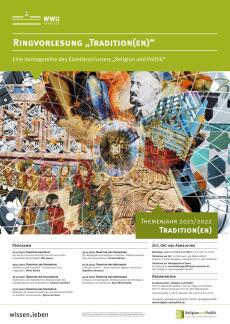Public lecture series on “Tradition(s)”
Traditions and changes in traditions from Ancient Egypt to the present day

To launch its second annual theme, on “Tradition(s)”, the Cluster of Excellence “Religion and Politics” is organizing an interdisciplinary lecture series of the same name that will deal with how traditions in, for example, literature, law and religions emerge, are transmitted, and change. Starting on 2 November, seven lectures will create a panorama from antiquity to the present day, using various traditions as examples to show the importance of processes of transmission and to examine how different actors interact in such processes.
The thematic spectrum ranges from the ancient Egyptian god Amun, to tradition and innovation in Arabic literature, and to the transmission of religious traditions in families today, with lectures being given by members of the Cluster of Excellence and the University of Münster from the disciplines of Egyptology, Arabic studies, Catholic theology, philosophy, law, Romance studies, and sociology.
As the Jewish scholar Regina Grundmann and the Catholic theologian Michael Seewald explain, at least three perspectives can be distinguished in the study of tradition(s): the process of transmission or the act of handing down (“tradition”); the content or practices of what is handed down (“traditions”); and the actors or the groups carrying the tradition (“tradents” and recipients, as well as their relationship with one another). Taking case studies from different epochs, the lecture series “Tradition(s)” will illuminate these three perspectives in different ways. The lecture series has been put together by Regina Grundmann and Michael Seewald, together with the classical scholar Alexander Arweiler and the Romance scholar Karin Westerwelle.
Second annual theme on “Tradition(s)”
Entitled “Tradition(s)”, the second annual theme of the Cluster of Excellence “Religion and Politics” will use selected examples ranging from antiquity to the present to explore how traditions emerge and change, as well as the process of transmission, how various disciplines conceptualize the process, and the importance of the process for understanding religions. It will also examine how far criticizing, rewriting and re-appropriating traditions bring innovation to the religious landscape. Comprising many events and media formats, the 2021/22 annual programme will feature researchers from the humanities, history, law, and social sciences at the Cluster of Excellence and the University of Münster. (sca/vvm)

